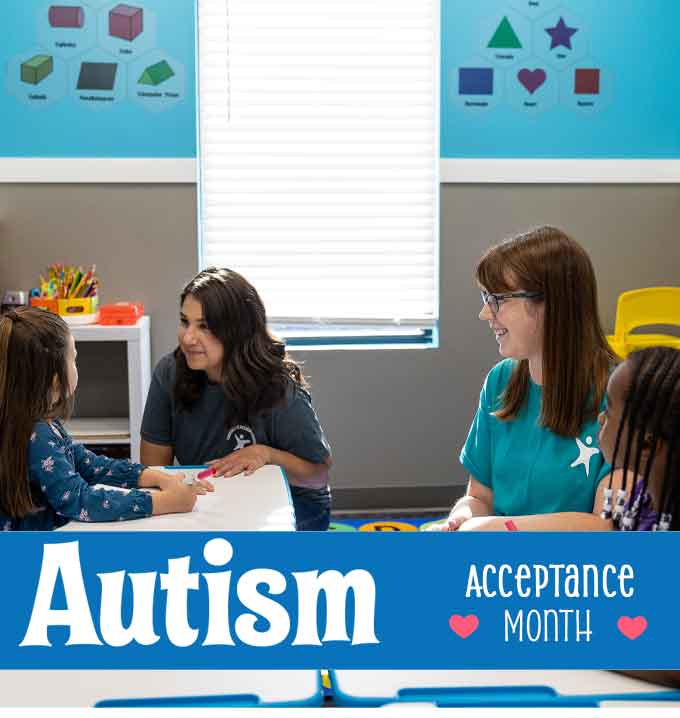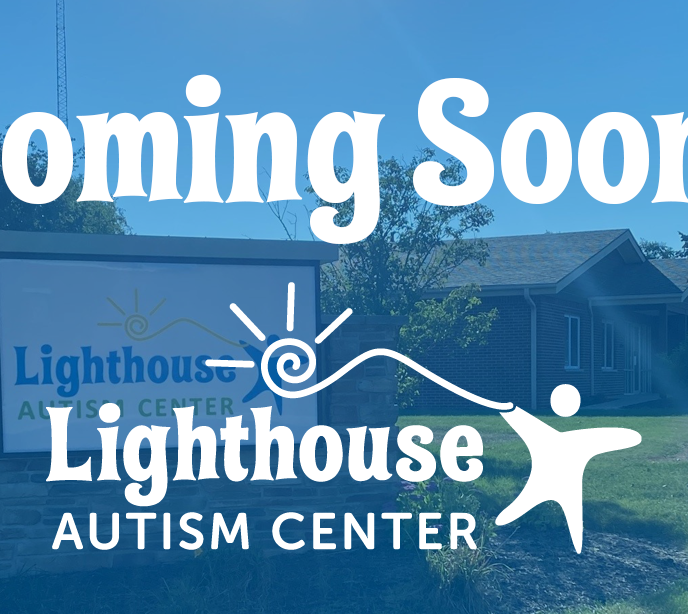Embracing Autism Acceptance Month: Moving Beyond Awareness
From Awareness to Acceptance: A Meaningful Shift
Every April, the world recognizes Autism Awareness Month, but in recent years, the movement has evolved toward Autism Acceptance Month, a shift that embraces not just recognizing autism but fostering understanding, inclusion, and support. Lighthouse Autism Center is proud to stand at the forefront of this movement, advocating for meaningful change in how society perceives and supports autistic individuals.

The “Red Instead” Movement: A Step Toward Authentic Representation
For years, blue has been associated with autism awareness, largely due to campaigns by mainstream organizations. This color choice originated from the early misconception that autism primarily affected boys, leading to the adoption of blue as a symbolic color. Research has since shown that autism is diagnosed in boys approximately four times more often than in girls (CDC, 2023), though growing evidence suggests that autism in girls is often underdiagnosed or misdiagnosed.
However, many autistic self-advocates and allies have championed the “Red Instead” movement, emphasizing empowerment and neurodiversity rather than a medicalized view of autism. By choosing red, we honor autistic voices and celebrate their contributions to society rather than focusing solely on challenges.
Moving Away from the Puzzle Piece: A Symbol of Change
Another significant shift in autism advocacy is moving away from the puzzle piece symbol. Historically used to represent autism, the puzzle piece has been criticized for implying that autistic individuals are “missing pieces” or need to be “solved.” Instead, the infinity symbol, often in gold or a spectrum of colors, has gained traction, representing the diversity and richness of the autism community. At Lighthouse Autism Center, we support symbols that reflect acceptance, respect, and the beauty of neurodiversity.
The Importance of Early Intervention in Autism Support
While advocacy is crucial, so is access to high-quality support and intervention. Early intervention plays a pivotal role in helping autistic children build communication, social, and daily living skills. Research shows that children who receive early, evidence-based interventions, such as Applied Behavior Analysis (ABA) therapy, experience significant improvements in skill development and quality of life.
At Lighthouse Autism Center, our Naturalistic ABA approach fosters learning in a child-led, engaging environment that prioritizes joy and meaningful connections. Our dedicated teams of Board Certified Behavior Analysts (BCBAs) and Registered Behavior Technicians (RBTs) work closely with families to tailor individualized therapy plans.
How You Can Get Involved This Autism Acceptance Month
Autism Acceptance Month is about action. Whether you are a parent, caregiver, educator, or medical professional, there are many ways to support the autism community:
- Educate Yourself and Others: Read books, listen to autistic voices, and share accurate information about autism.
- Support Autistic-Owned Businesses and Creators: Purchase from businesses run by autistic individuals or follow and share their content online.
- Advocate for Inclusive Policies: Encourage schools, workplaces, and communities to adopt neurodiversity-friendly practices.
- Participate in Autism-Friendly Events: Join walks, fundraisers, or sensory-friendly community events that promote acceptance and support.
- Choose Acceptance-Based Language: Avoid deficit-based language and instead use strengths-based, person-first, or identity-first language as preferred by autistic individuals.
Why Autism Acceptance Matters to Lighthouse Autism Center
At Lighthouse Autism Center, acceptance is more than a word, it’s our mission. Every child we support, every therapy session we provide, and every family we walk alongside represents our unwavering commitment to celebrating the strengths of autistic individuals. We envision a world where autism is not just understood but embraced, where individuals are seen for who they are, not who society expects them to be.
As we celebrate Autism Acceptance Month, let’s move forward together with compassion, education, and advocacy. Whether through therapy, awareness, or everyday interactions, we all have a role to play in creating a more inclusive world for autistic individuals and their families.
Join us in making a difference this month and beyond.
References:
- National Institute of Mental Health. (n.d.). Autism Spectrum Disorder.
- Autistic Self Advocacy Network (ASAN). (n.d.). Red Instead Movement.
- Behavior Analysis in Practice. (2020). Importance of Early ABA Therapy in Autism Intervention.
Together, we can unlock your child’s potential
Related News

09/25/2025
Smithfield Open House at Lighthouse Autism Center
You’re Invited: Smithfield Open House at Lighthouse Autism Center We’re excited to announce that Lighthouse Autism Center is officially opening its newest location in Smithfield, North Carolina, and we’d love for you to celebrate with us! Join us for a community open house on Tuesday, October 28, 2025, from 4:30–6:30 p.m. at our brand-new center, […]

08/11/2025
Lighthouse Autism Center Opens New Center in Monroe, Indiana!
ABA Therapy Center is Now Open in Monroe, North Carolina Lighthouse Autism Center (LAC) is excited to announce the opening of a new center in Monroe, North Carolina, on August 11, 2025. This marks another important milestone in our continued expansion, which now spans multiple states and supports hundreds of families across the country. What […]

08/05/2025
Lighthouse Autism Center is Expanding with a New Center in Smithfield, North Carolina
Lighthouse Autism Center is opening a second location in Smithfield, North Carolina Lighthouse Autism Center (LAC) is thrilled to announce the opening of our fourth location in North Carolina in the town of Smithfield, approximately 30 miles southeast of downtown Raleigh. Scheduled to open in October 2025, this new center reflects our commitment to expanding […]


